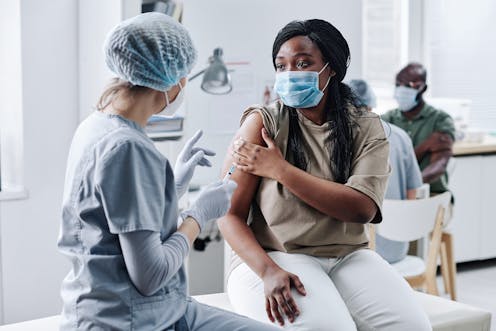
The UK Joint Committee on Vaccination and Immunisation (JCVI) recently recommended that the current autumn booster campaign, offering additional COVID vaccine doses to higher-risk groups, including people with certain medical conditions and those aged over 50, will end on February 12.
Vulnerable groups will be offered COVID boosters in autumn 2023, with additional boosters in spring 2023 for those at highest risk. But, for a large portion of people, there will be no more COVID vaccines.
The offer of third doses to everyone over 16 will be withdrawn after February 12, with no indication it will be reinstated. The offer of primary COVID vaccinations also looks likely to end during 2023 for most people, including children.
So if you’re a non-vulnerable person aged under 50 who is yet to receive a first, second, or third dose, come February 12 you may well have missed your chance.
In their statement, the JCVI highlight waning vaccine uptake, and note rescinding the offer of third doses comes “as the transition continues away from a pandemic emergency response”. Their message is that targeted vaccination of the vulnerable is sufficient to allow us to “live” with COVID.
This is shortsighted at best. It means that in the future, paradoxically, most people will only obtain any immunity to SARS-CoV-2 (the virus causing COVID) by becoming infected. This contradicts the fundamental premise of safe vaccination.
The pandemic remains unpredictable
In England there were roughly 135,000 direct COVID hospital admissions in 2022, with around 33,000 deaths involving COVID (COVID was main underlying cause in 66%).
Some 1.8 million people in the UK report suffering from long COVID for at least 12 weeks, around 650,000 of whom developed the condition from infections in 2022.
While endemic respiratory viruses cause one, or sometimes two, waves of infection annually, SARS-CoV-2 isn’t seasonal, it’s pandemic and perennial. 2022 saw five omicron waves in the UK, and another is starting.
Omicron has caused multiple waves because it evolves very quickly. This allows SARS-CoV-2 to infect more people, despite vaccines and immunity gained in previous waves, by evading prior antibody responses.
Read more: Six common COVID myths busted by a virologist and a public health expert
Vaccination is better than infection – including in kids
Whether you have immunity from prior infection, vaccination, or both, a growing narrative suggests it’s OK to catch SARS-CoV-2 unless you’re “vulnerable”. But while both vaccination and prior infection reduce the risk of serious consequences from COVID, they clearly don’t reduce it to zero.
Also, protection wanes over time. Though no medicine is completely risk-free, a booster vaccine can “top up” immunity safely, without the considerable risks of an infection. And vaccines add significant protection even if you’ve already had COVID.
Even in children, who are at reduced risk of severe COVID compared with adults, vaccination has clear benefit. COVID is a major risk among paediatric infections. Smaller risks are magnified when so many are infected (as we saw in 2022, when the large majority of children under 11 caught COVID at least once). Vaccination also reduces the risk of long COVID.
Strikingly, as many children under five are admitted to intensive care with COVID as those aged between 45 and 54 (although the latter are now mostly vaccinated). Risk declines in primary school-aged children, then starts to build again through adolescence and into adulthood.

COVID vaccines provide children with excellent protection against severe disease, though less so from infection. In the UK they’re only offered to children who turned five before September 2022, making the UK an outlier compared with many other wealthy countries, which offer COVID vaccines consistently for children aged five and older.
COVID vaccines have also been approved in the UK for children under five, but are not currently offered. This contrasts with a growing number of countries including the US and Israel which now vaccinate this youngest age group.
So it appears that children in the UK who were too young before September 2022, or missed their primary doses, will soon have no opportunity to get vaccinated against COVID unless they’re clinically vulnerable. Instead, they face multiple infections.
Mixed messages
One-quarter of the English population remains unvaccinated. Most are children, but this also includes nearly 30% of adults under 40. As well as age, uptake varies with social deprivation and ethnicity, exacerbating health inequalities.
Inconsistent messaging from politicians and health leaders, including presenting infection in children as preferable to vaccination, has probably played a key role in reducing vaccine uptake. The JCVI has been at best lukewarm in its endorsement of vaccines for children.
In the face of this mixed messaging, it’s somewhat ironic they cite low uptake as a reason for withdrawing current offers.
Removing choice from those who are as yet unvaccinated to come forward is highly unusual and doesn’t occur for any other UK vaccine programme we know of.
It also positions the UK apart from other wealthy countries which are offering continual booster programmes. For example, Australia has been offering fourth doses for some time and is shortly going to make fifth doses available widely for adults. The US is also planning free annual boosters for healthy adults and, crucially, continues vaccinations for preschool children.
Vulnerable people will remain at risk
Paradoxically, those JCVI would seek to protect via targeted vaccination are those least likely to respond well to vaccines. There is also a dwindling number of therapeutics available in the UK to protect this vulnerable group from serious disease if they do become infected.
Offering boosters and maintaining primary vaccines in the wider population, ideally from preschool, would give added protection to younger people or those currently unvaccinated. It would also indirectly protect those who are vulnerable by reducing infections and onward community transmission.
Stephen Griffin is affiliated with Independent SAGE and is a Champion for the Long COVID Kids Charity. Stephen would like to thank Christina Pagel for her comments on an earlier draft of this article.
This article was originally published on The Conversation. Read the original article.







